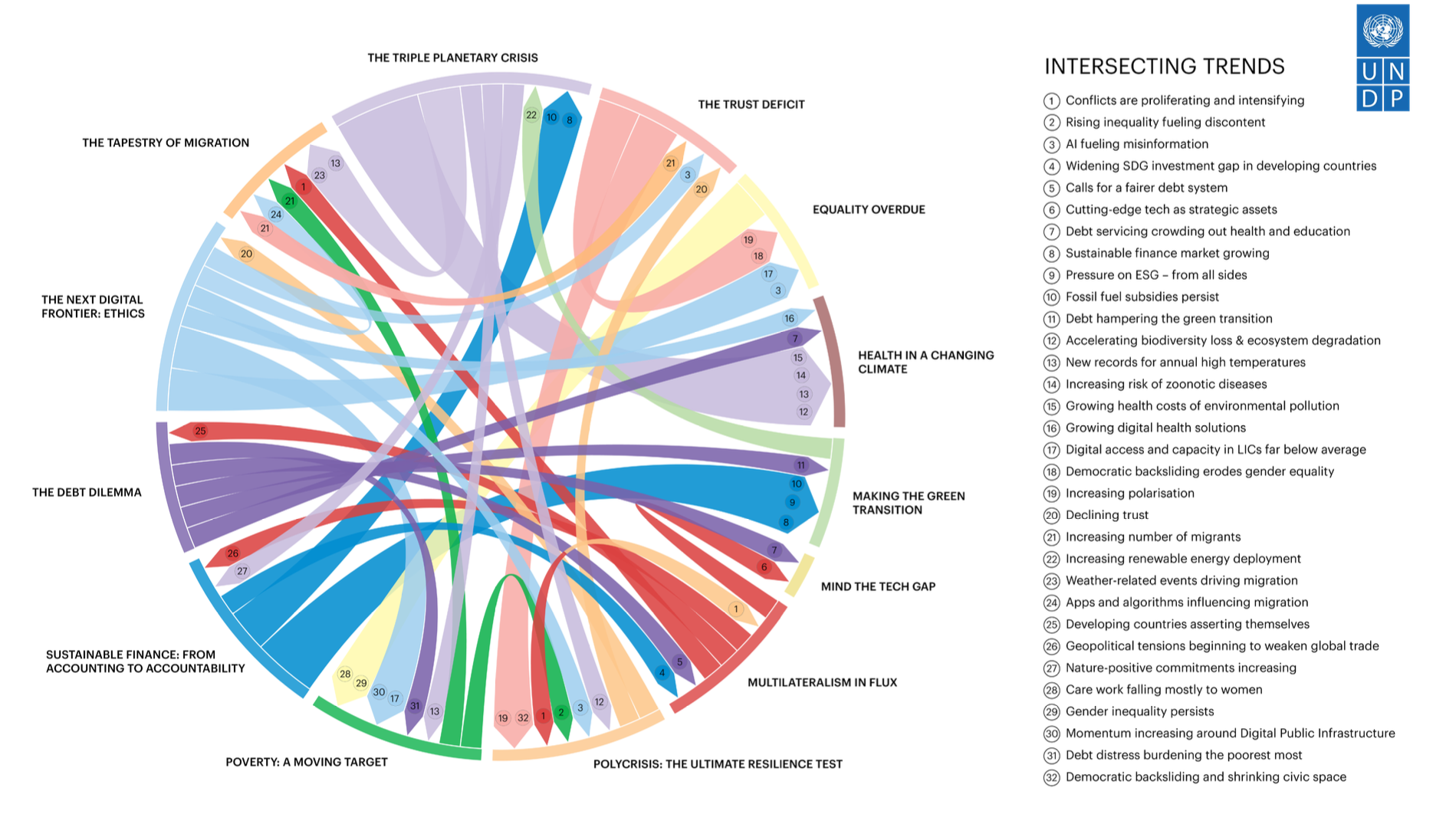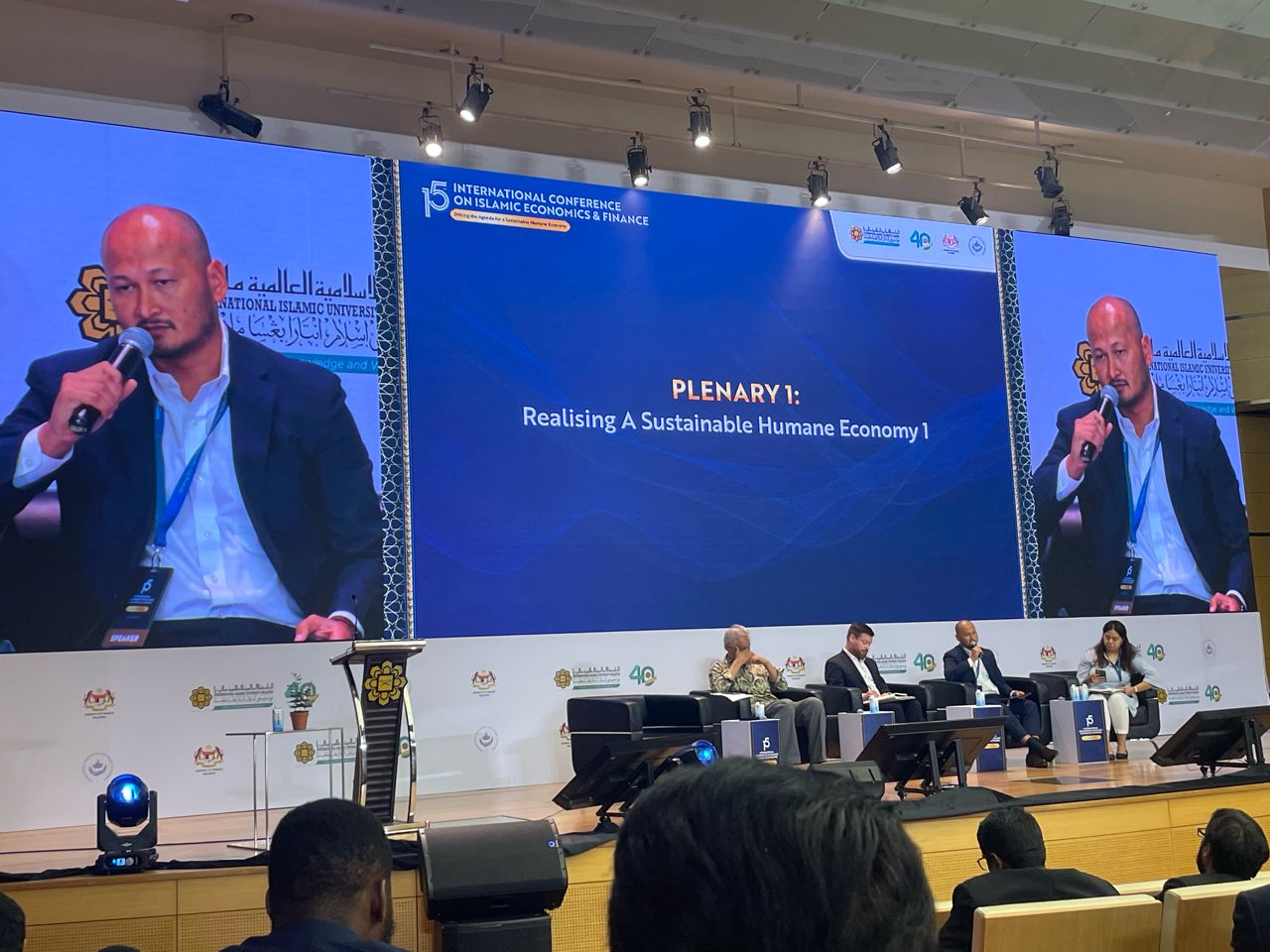Looking Beyond GDP in the Polycrisis Era: Towards a Dashboard Approach for Malaysia
March 19, 2024
Written by: Dr. Alizan Mahadi, Senior Economist and Head of Sustainable Development Policy
UNDP Malaysia, Singapore and Brunei Darussalam
We are living in a time when peace is being threatened through conflicts and wars, extreme weather events are increasing in frequency and intensity, and we are also seeing discontent among large populations that lead to a trend of populism and nationalism. The recently released 2024 UNDP trends report, highlighted these challenges and others in illustrating the polycrisis that the world is facing.

The Intersecting Trends from the 2024 UNDP Trends Report
As highlighted in the 2024 Regional Human Development Report in Asia and the Pacific, while progress has been made, disparity and disruption remains. The question turns to setting new directions for human development that expand people’s choices, enhance human security, and safeguard the interests of future generations.
In other words, while economic growth remains necessary, there is a need to find pathways for the right kind of growth. It has long been recognised that our economic models often overlook the aspects of distribution, of holistic human well-being, and places disproportionate value on activities that deplete the planet.
To address this challenge, there has been momentum on moving beyond Gross Domestic Product (GDP) as a measure of progress. This includes the Human Development Index (HDI), developed by UNDP, and led by Mahbub ul-Haq in 1990, with the aim of shifting the focus of development from national income accounting to people-centred policies. Anchored on the capabilities approach by Amartya Sen, its focus is on expanding people’s choices and freedoms. As a composite index, it includes indicators on health and education (beyond national income) as a summary measure for long term progress.
Another approach for beyond GDP is to use a stock approach – as opposed to flows – to measure wealth that underpins a nation’s income flows and well-being. For example, the United Nation’s Environment Programme’s (UNEP) Inclusive Wealth Index considers the aggregate value of capital assets, including natural, human and produced capital. It measures long term sustainability by accounting for changes in productive capital stocks as opposed to short term measures of flows, that can, for example, be boosted by overconsumption of natural capital.
While the above approaches focuses on the means for development, attention has also been provided to measure the ultimate ends, in particular, of social well-being. Bhutan’s Gross National Happiness, for example, aimed to measure collective well-being, based on Buddhist and cultural definitions of well-being. The Sustainable Development Solutions Network (SDSN) has produced World Happiness Reports annually since 2013 based on happiness measurement surveys undertaken by Gallup.
While all the measures above and other emerging ones provide potential measures to rival GDP as a measure of progress, the consensus that is emerging is that there is no single composite index that can capture holistic well-being. This was one of the major conclusions of the landmark Stiglitz-Sen-Fitoussi Commission on Beyond GDP recommendations.

Dr. Alizan Mahadi, Senior Economist, UNDP Malaysia, sharing UNDP's holistic approach to track and monitor the progress of development, at the 15th International Conference on Islamic Economics and Finance (ICIEF) in Kuala Lumpur.
Following this thinking UN Secretary General called for the establishment of an independent high-level expert group, and to develop a dashboard of a limited number of key indicators that go beyond GDP. The results will be presented at the Summit of the Future in September this year.
In the context of Malaysia, there has long been an interest to develop measurements that go beyond GDP. For example, the Malaysian Quality of Life Index (MQLI) was developed in 1999 to measure indicators such as access to basic needs. This was replaced in 2013 by the Malaysian Well-being Index which expanded the indicators to include ‘economic well-being’, alongside ‘social-well-being’. Many of the social wellbeing indicators were still based on access.
These indicators, while providing progress on issues of access, however, were not used as a macroeconomic framework and were not able to inform the System of National Accounts.
Moving forward, UNDP Malaysia, Singapore and Brunei are working on various projects that can contribute significantly towards Malaysia’s dashboard for going beyond GDP. These include:
- Multidimensional Poverty Index – UNDP is supporting the Ministry of Economy to review and enhance Malaysia’s nationally adjusted Multidimensional Poverty Index (NMPI) in which the MPI revision will expand on existing dimensions and indicators to be more comprehensive in better reflecting the measurement of multidimensional poverty.
- Green Economy Macroeconomic Framework – UNDP is supporting the Ministry of Economy to develop a Green Economy Framework and Model as a policy tool for macroeconomic decision-making.
- Human Development Index – Malaysia has announced an ambition to be ranked top 25 in the Human Development Index within 10 years under the Madani Economy Framework, the national vision for Malaysia.
The progress on these measurements will be instrumental towards establishing a dashboard of indicators for Malaysia to go beyond GDP. While further indicators that target more subjective well-being ends may be an interest under the Madani Economy Framework, established frameworks such as the above can provide the ingredients and inform a transformative model of economy for Malaysia.

 Locations
Locations



